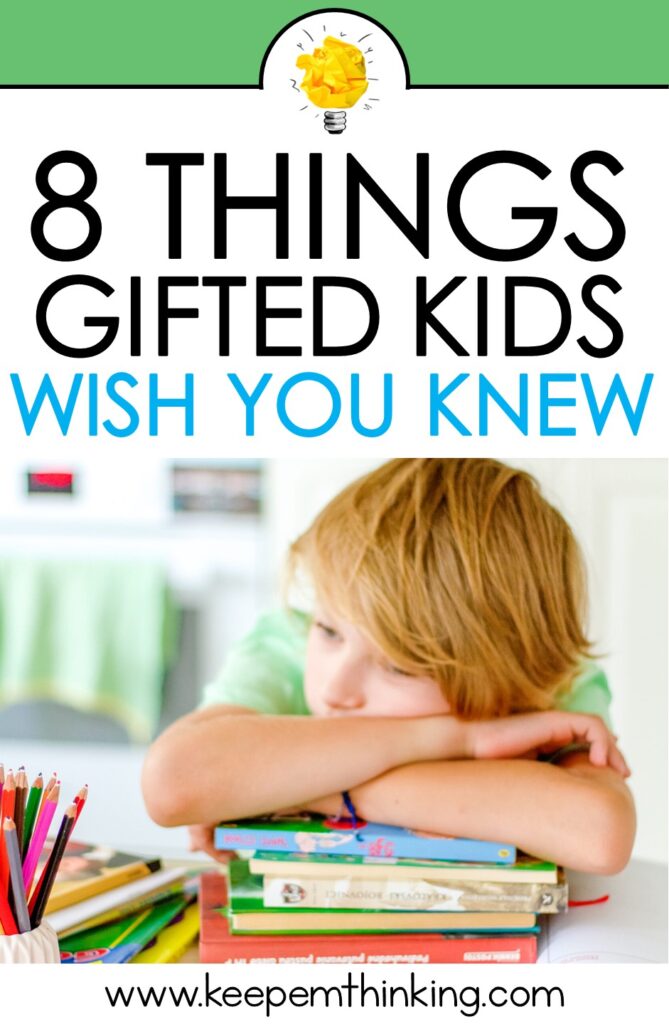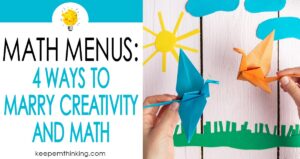When teachers have gifted students in their class, they often breathe a sigh of relief. “Whew, I don’t have to worry about that student!” they might think to themselves. And while gifted learners do have special talents and abilities that set them apart from others, they have needs you might not have ever heard about. At the end of the day, they are still kids who come to school to learn yet face their own struggles. Are you curious as to what gifted learners feel at school every day? Read on for the inside scoop on 8 surprising things gifted students wish you knew. You will never look at your gifted students the same way again!
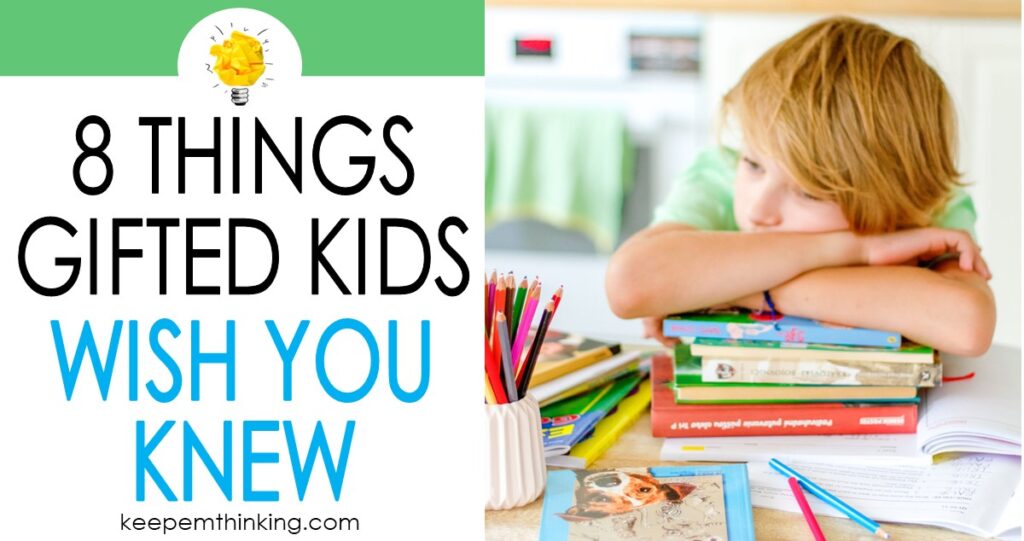
1. “I don’t mind helping other kids some of the time, but I like to do things that challenge me when I finish early.”
This is a feeling I have heard all too often from gifted students. Teachers are stretched thin in the classroom, and it can be tempting to use your high flyers as tutors to help your struggling students.
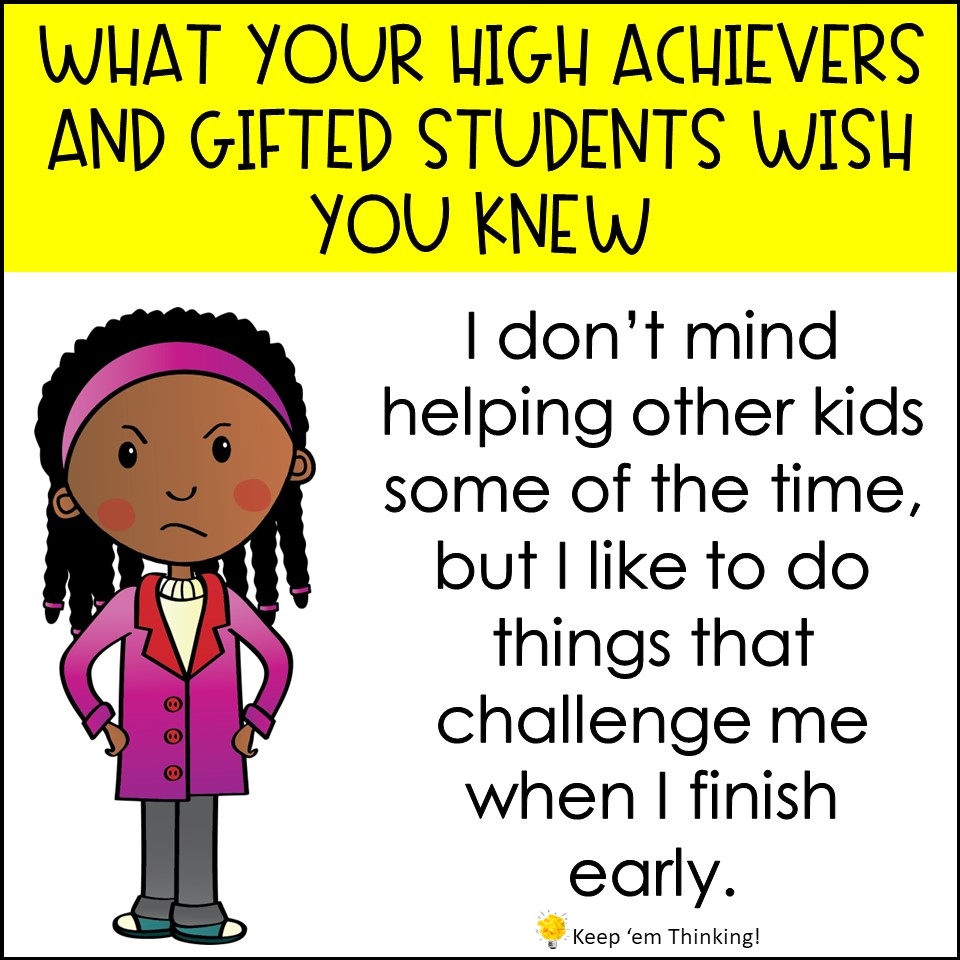
There’s nothing wrong with that when used sparingly, but your gifted students deserve a chance to grow and learn new things too.
If they are constantly helping struggling students, they will not have that chance.
Allow your gifted students to complete tasks or projects that push them to think creatively and critically.
Pursuing knowledge in their areas of interest with research projects on a topic of their choice is a great beginning! If you want something a bit more structured, keep a basket or folder with printed enrichment activities such as Sudoku puzzles, Logic puzzles, Choice Boards, and open ended questions to keep your high flyers pushing their limits.
2. “I often get bored when I have to do something I already know how to do. Please challenge me instead.”

Gifted learners usually finish regular classroom work quickly because they know the information and can apply it easily.
And unfortunately, they don’t find a lot of those activities as fun as other students might. Gifted students need (and enjoy!) a good challenge!
These kids often thrive on intellectual stimulation and are motivated by tasks that require “outside the box” thinking.
Give them a STEM challenge, creative writing prompt, or digital activity that requires learners to tap into their creativity, problem-solving skills, and critical thinking abilities!
3. “I don’t like having to work by myself all the time because I already know what the class is working on. Sometimes I like to be part of the group.”
Regardless of ability, students love working together in groups! It gives kids the chance to be social and is more fun than just working by yourself.
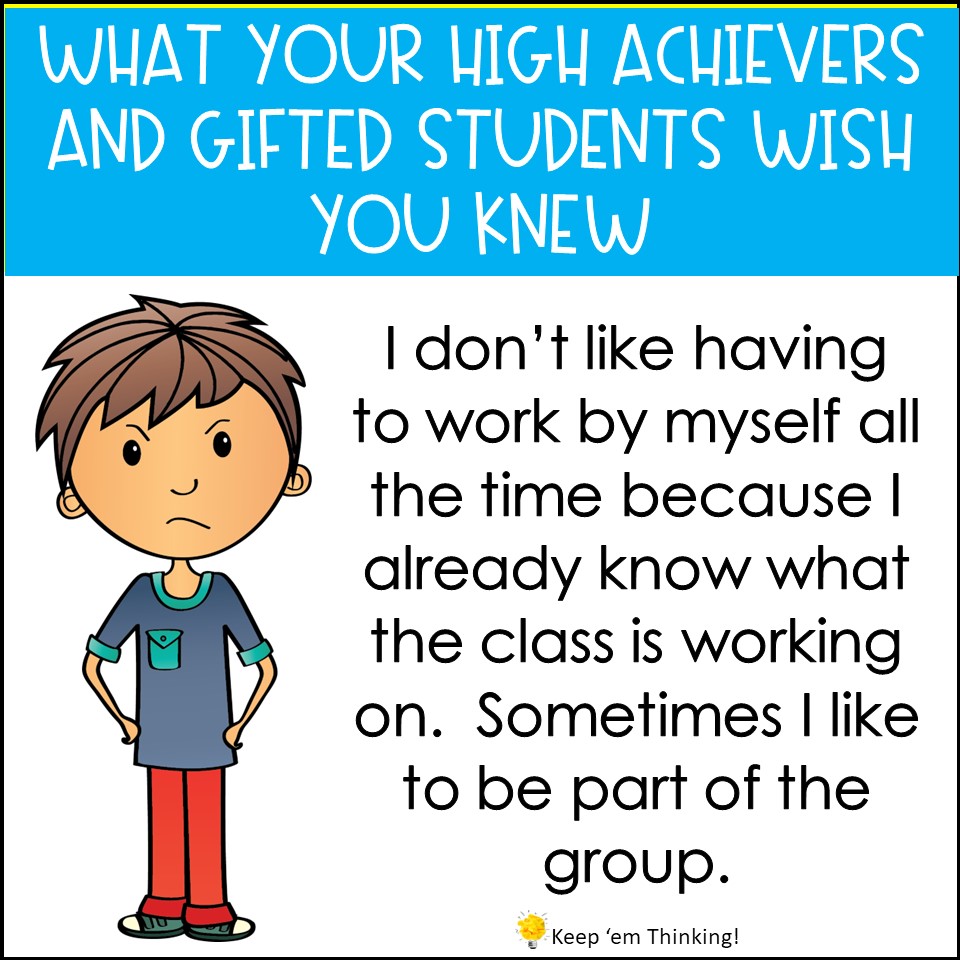
Oftentimes, gifted students end up working by themselves because the assignment was easy and they finished quickly. No one else is finished yet and they’re doing busy work on their own.
Allow your gifted students to work in groups with students of all ability levels using activities that all kids can participate in!
Low Floor High Ceiling Math Tasks are the perfect way to allow students to work in groups but differentiate the work as well! Check out this blog post to learn about Low Floor High Ceiling Math Tasks and how to incorporate them into your classroom!
4. “I don’t like being singled out as “gifted”. It makes fitting into the class and making friends challenging.”
All most kids want is to be accepted, included, and feel like they belong in your classroom.

Oftentimes, gifted learners already feel “different” so labeling them as “special” can be embarrassing.
Singling out gifted students can create feelings of isolation as well as hurt the overall classroom dynamic. Other students may feel jealous and try to compete with your gifted learners, or worse, be resentful of them because they feel left out.
Instead of singling out your gifted students, create a classroom environment that supports all learners.
Give opportunities for every student to succeed with building challenges, art projects, and acting or singing. Celebrate everyone’s different strengths and accomplishments! By focusing on how all students are smart, you will create a happier atmosphere for everyone.
5. “All gifted kids are different. We don’t fit into a mold. We learn different ways and like different things.”
When you think of gifted students, what comes to mind? Being excellent readers, breezing through math problems, and always knowing the right answer in Science class, probably!

But gifted students don’t always follow that expectation. These kids have different learning styles, interests, and abilities. Some may prefer visual learning, while others enjoy hands-on learning. Some gifted children may have a passion for science or math, while others may excel in creative fields such as art or music.
It’s important to remember that gifted kids are not all the same. We need to recognize and appreciate their individuality so that we can help them grow and learn in their own way.
Start by giving students choices in how they learn and complete assignments, like doing a project or making a video. Allow them to explore topics they’re interested in on their own and share what they learn with the class. By allowing gifted students to learn in their own unique way, you can help them reach their full potential.
6. “I may prefer to spend time with intellectual peers and/or adults rather than my age peers.”
Your gifted students like spending time with intellectual peers and adults. They enjoy the higher level of thinking that comes with talking to people who think differently (just like they do!).

Being with others who share their interests and abilities provides them with the stimulation they need. They may also feel a sense of belonging and more comfortably express their ideas with those who have similar levels of knowledge and understanding.
Allow your gifted learners to learn and grow in new ways. Motivate them to think more creatively and critically when working with people who are at a similar or higher level of intellectual ability. Group your gifted learners together or coordinate with teachers from other grade levels so that your gifted students can work together on a project.
The saying “Iron sharpens iron” holds true – gifted students push other gifted students to grow and think more deeply!
7. “I may like to be the first one finished with my work, so I rush and make careless mistakes.”
Oftentimes, gifted students will zoom right through an assignment. You think their grade will be an easy A until you grade it and find lots of tiny mistakes.
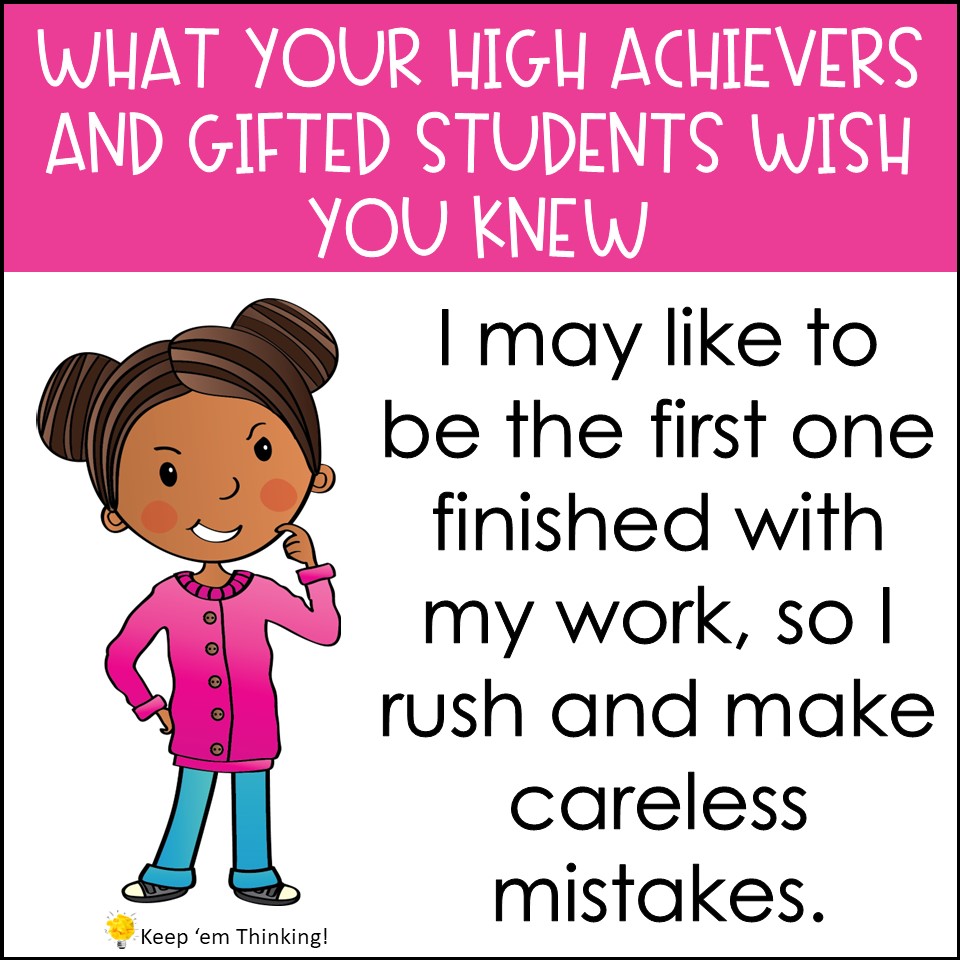
Why is that? Gifted learners tend to rush through their work so they can move on to something more challenging (they’re bored and don’t care). Sometimes, they simply want to “look smart” in front of the class or get recognition from you. It’s important to help your gifted student understand why they rush. Then explain how it hurts them along with strategies to help them slow down.
To help gifted students slow down and avoid making careless mistakes in their work, try these strategies. Encourage double-checking and give realistic time limits to help them stop rushing through assignments.
Give feedback and discuss why they made the mistakes they did and how to avoid them next time. Encourage your “rushers” to reflect on their work and show how slowing down and focusing more carefully can help them. Your gifted students are smart and they’ll get why rushing isn’t the way to go, but they may not understand fully without your guidance.
8. “I sometimes need guidance on how to deal with social interactions.”
They may be intellectually advanced for their age, but many gifted students struggle with social skills. These kids may also be more sensitive than their classmates, may struggle with managing their emotions, and can be easily overwhelmed by social interactions.
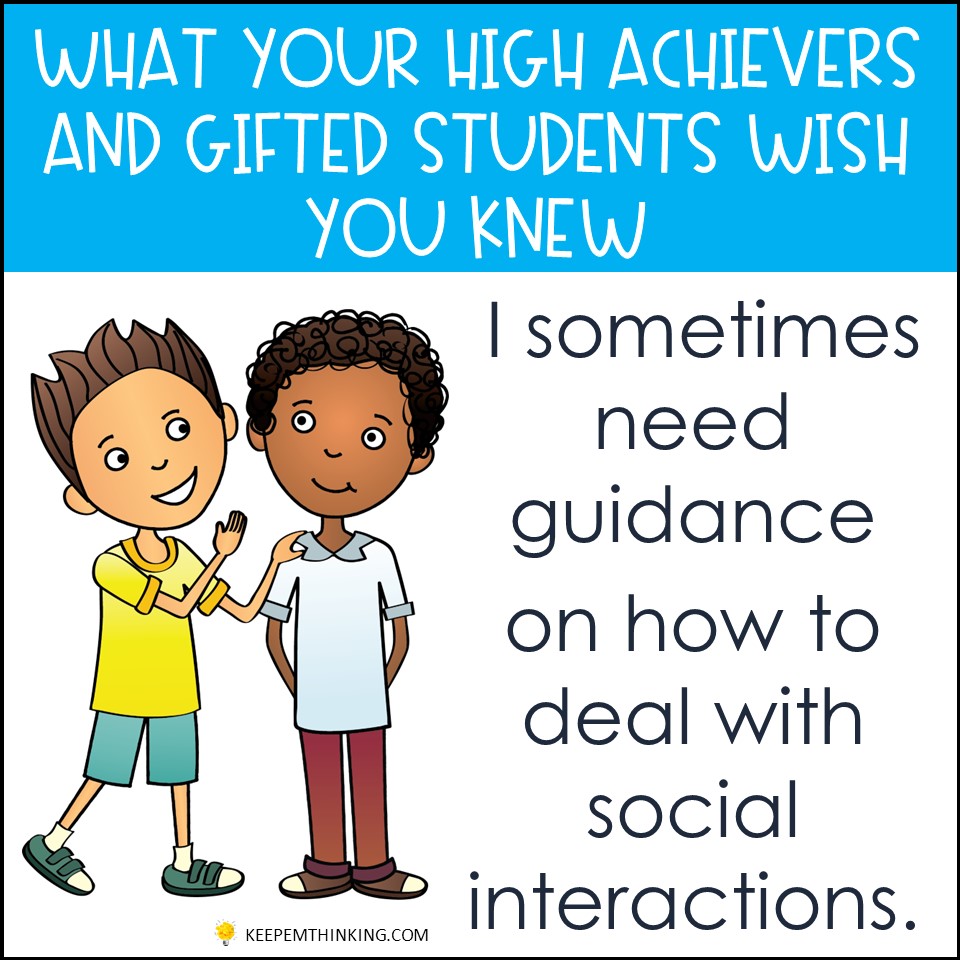
Gifted kids tend to have high standards for themselves and their interactions with others and sometimes struggle with disappointment or frustration when their expectations are not met. They can be highly critical of themselves and others which often offends their classmates.
How can you help your gifted students navigate social interactions and make friends? Allow students to talk to each other about common interests. Explicitly teach them how to actively listen and take turns during conversations. Explain how nonverbal communication such as eyebrow position, facial expressions, and arms across the chest can indicate how others feel. Give opportunities to practice these skills and share feedback on how they do. Your gifted kids can have better interaction with their classmates, it just takes some time and practice.
Are you surprised at what your gifted students wish you knew?
Your gifted students want what every kid wants: to feel accepted at school and to have fun learning! The information in this post will help you connect with your gifted students and help them feel more “seen” at school, but this was just the tip of the iceberg! Check out 8 More Things Gifted Students Wish You Knew- Part 2!
Pin these Gifted Student Ideas to Pinterest!
There is a lot of important information in this post and you don’t want to forget a thing! Pin this post to Pinterest any time you need advice on how to help your gifted students!
